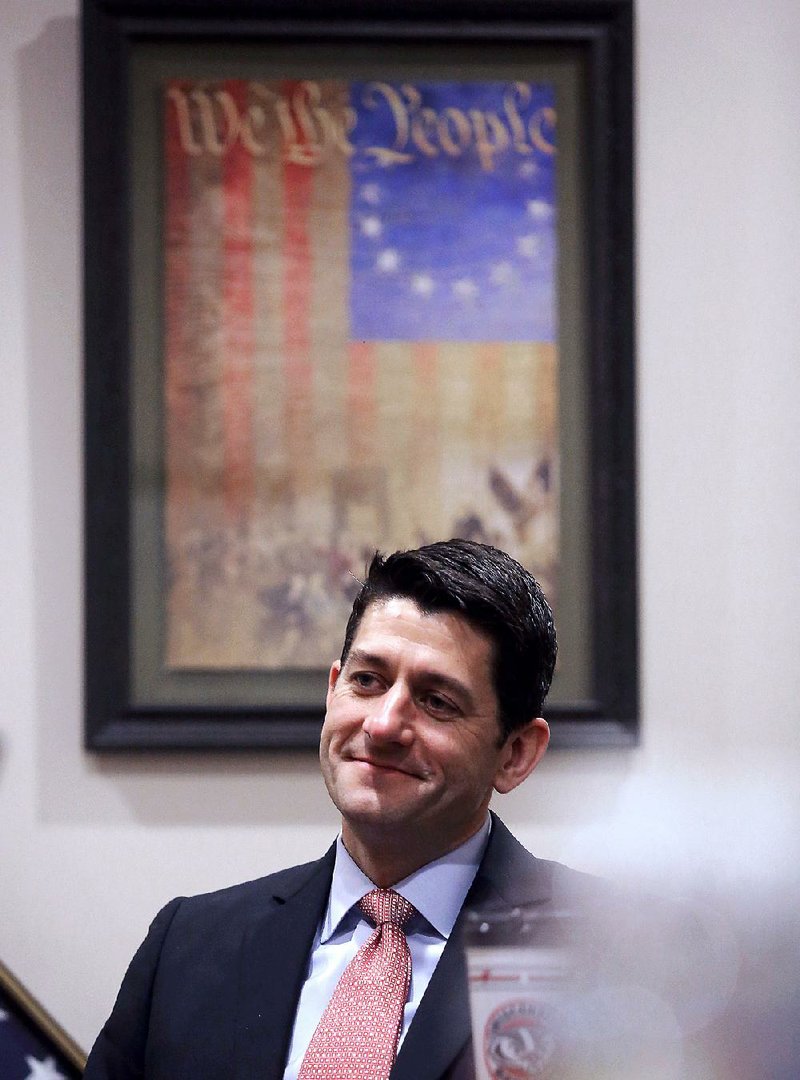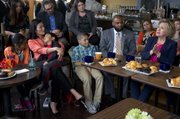WASHINGTON -- As more Republicans followed House Speaker Paul Ryan's lead in withholding their support from Donald Trump, Ryan said there's no point in trying to fake party unity.
FULL ELECTION COVERAGE
"If we go forward pretending that we're unified, then we are going to be at half-strength this fall," Ryan told The Journal Times in Racine, Wis., defending his refusal last week to endorse his party's presumptive presidential nominee.
But Ryan on Monday denounced the idea of any Republican launching a third-party or independent candidacy to challenge Trump, telling the Milwaukee Journal-Sentinel that it "would be a disaster for our party."
Ryan added that he would step aside from the House speaker's traditional role as chairman of the Republican National Convention if Trump wants him to, a scenario that Trump left open when asked over the weekend.
"He's the nominee. I'll do whatever he wants in respect to the convention," Ryan said.
Trump shrugged off the need for unity heading into the November general election.
"I think this is a time for unity. And if there's not going to be unity, I think that's OK, too," Trump said in an interview on Fox Business Network. "I mean, I'll go out and I think I'll do very well. I think I'm going to win the race either way."
The comments from Ryan and Trump came as they prepared for a face-to-face meeting Thursday. Trump will also meet Thursday with Senate Majority Leader Mitch McConnell of Kentucky and other Senate GOP leaders.
Ryan said he hopes he and Trump can get to know each other at their meeting.
"I just want to get to know the guy ... we just don't know each other," Ryan said.
"I never said never" to endorsing Trump, he said. "I just said [not] at this point. I wish I had more time to get to know him before this happened. We just didn't."
Party leaders worry that Trump's candidacy could cost Republicans control of the Senate. Even in the House, where Republicans command the largest majority, some members have expressed concern.
Several newly elected lawmakers who could face difficulty in November, including Martha McSally of Arizona, Will Hurd of Texas and Barbara Comstock of Virginia, have told home-state publications that they are not ready to back Trump.
Republican Sen. Pat Toomey, who is up for re-election in Pennsylvania, wrote an opinion piece in the Philadelphia Inquirer drawing back from his long-stated intent to back Trump.
"His vulgarity, particularly toward women, is appalling. His lack of appreciation for constitutional limits on executive powers is deeply concerning. ... In short, I find his candidacy highly problematic," Toomey wrote of Trump. "There could come a point at which the differences are so great as to be irreconcilable."
Another Republican in a divided district, Rep. Charlie Dent of Pennsylvania, said in an interview that he and others were finding it difficult to support Trump given his history of incendiary comments and uncertain record as a Republican, including past donations to Democrats such as Hillary Clinton.
"When you're a candidate running for office, you don't like to be in a position where you have to put distance between yourself and someone in your own party," Dent said. "But in this case, you're compelled to do it because of the nature of these inflammatory statements."
Bobby Jindal, the former Louisiana governor and presidential candidate who in September called Trump a "narcissist" and an "egomaniacal madman" who had no principles, said he would vote for Trump despite his concern about his candidacy.
Explaining his predicament in a Wall Street Journal opinion article, Jindal said he would support Trump "warts and all" because he thinks that Clinton would be a more dangerous option for the country as president.
Another former opponent, Sen. Marco Rubio of Florida, who has been mentioned by Trump as a potential vice presidential pick, issued a statement saying he wasn't interested because Trump "will be best served by a running mate and by surrogates who fully embrace his campaign."
Trump's tendency to shift stances on policy issues has also raised concern. That issue arose anew Monday as he defended a weekend suggestion that his tax plan could be negotiable. Clinton aides pounced on the issue in a conference call while Trump defended himself, saying, "This is a negotiation."'
Trump suggested over the weekend that he would try to negotiate down the cost of the national debt with the country's creditors. The comments were interpreted as Trump seeking to use the possibility of debt default as leverage, which economists warned would represent a threat to investor confidence and could affect interest rates.
Trump walked back those comments Monday, accusing his rivals and the news media of intentionally misrepresenting his words.
"If interest rates go up and we can buy bonds back at a discount, if we are liquid enough as a country, we should do that. In other words, we can buy back debt at a discount," he said in an interview with CNN. "People said I want to go and buy debt and default on debt, and these people are crazy."
Also Monday, Trump announced that New Jersey Gov. Chris Christie, a former foe but now an enthusiastic supporter, would head his transition team if he wins the November election.
Sanders Plugs Away
In the Democratic race, Sen. Bernie Sanders of Vermont urged his supporters to keep fighting, even as Clinton continues to hold a large lead.
"If we can win here in New Jersey and win in California and win in some of the other states and if we can win a majority of the pledged delegates, we're going to go into Philadelphia and the Democratic convention and expect to come out with the Democratic nomination," Sanders said during a rally in Atlantic City, N.J.
Sanders trails Clinton by nearly 300 pledged delegates -- those won in primaries and caucuses. Clinton also holds a commanding lead among superdelegates, the elected officials and party leaders who can support the candidate of their choice. That leaves her 155 delegates short of the 2,383 she needs to secure the nomination.
Sanders continues to draw large crowds to his rallies. But his fundraising has dipped and his advertising has dropped, with about $525,000 in ads planned for California and $63,000 each in West Virginia and Oregon, according to advertising tracker Kantar Media's CMAG.
His wife, Jane Sanders, who serves as a top adviser, disputed that the campaign was running out of options. She said superdelegates could switch their commitments, suggesting they should consider the results in their home states.
"There have been a lot of surprises," Jane Sanders said. "We saw a Michigan miracle and Indiana, no one expected."
Information for this article was contributed by Erica Werner, Nicholas Riccardi, Jill Colvin, Catherine Lucey and Lisa Lerer and staff members of The Associated Press; by Mary Spicuzza and Craig Gilbert of the Milwaukee Journal Sentinel; and by Alan Rappeport of The New York Times.
A Section on 05/10/2016

